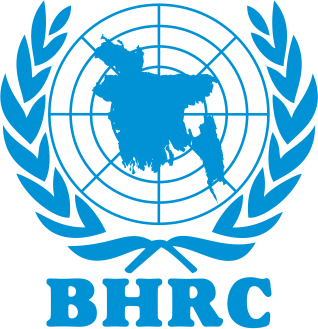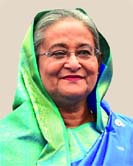

|
EDITOR
|
Editorial
‘Fortnightly’
পাক্ষিক |
|
|
Parosi pehele, lekin Bangladesh sabse pehele: Sushma

Human Rights Report
Prime Minister
Sheikh Hasina and her Indian counterpart Narendra
Modi have already laid a strong foundation of
cooperation between the two countries. To review the
growing relations, Indian External Affairs Minister
Sushma Swaraj paid an official visit to Bangladesh
on October 22-23 that could afford an opportunity
for review of the excellent bilateral relations
between Bangladesh and India.
This was the second visit of Sushma to Bangladesh
and comes soon after the State visit of the Prime
Minister of Bangladesh to India in April 2017.
During the visit, she and her Bangladesh counterpart
AH Mahmood Ali co-chaired the 4th meeting of the
India-Bangladesh Joint Consultative Commission.
The External Affairs Minister said Bangladesh gets
priority among all India's neighbours as per its
neighbourhood policy.
"Our foreign policy follows neighbourhood first
approach. Parosi pehele, lekin Bangladesh sabse
pehele (Among all neighbours [of India] Bangladesh
comes first)," she said reflecting India's growing
importance to Bangladesh.
Calling her Bangladesh counterpart AH Mahmood Ali as
his 'brother and Dada', Sushma assured Bangladesh of
resolving all the issues transparently and
sincerely.
.
Total 154 persons killed in Ocotber, 2017
Human Rights Report:
The documentation section of
Bangladesh Human Rights Commission (BHRC) furnished
this human rights survey report on the basis of
daily newspapers and information received from its
district, sub-district and municipal branches. As
per survey it appears that 154 peoples were killed
in October, 2017 in all over the country. It proves
that the law and order situation is not
satisfactory. Bangladesh Human Rights Commissions
extremely anxious about this situation. In the month
of October, 2017 average 5 people were killed in
each day.
The Law enforcing agencies and related Govt.
departments should be more responsible so that
percentage of killing October be brought down to
zero level. To institutionalize the democracy and to
build human rights based society the rule of law and
order must be established everywhere. Through
enforcing rule of law only such violation against
human rights can be minimized.
It appears from documentation division of BHRC:
Total 154 person killed October, 2017
Killing for dowry 3, Killing by family violence 25,
Killed due to social discrepancy 45, Political
killing 3
Killed by Law enforcing authority 2, Killed by BSF
2, Killed due to doctor negligence 4, Kill due to
abduction 7, Assassination 5, Mysterious death 56,
Women & Chilled killed due to rape 1, Killed by acid
throwing 1.
Killed by several accidents:
Killed by road accident 222, Suicide 21
Besides victims of torture:
Rape 41, Sexual Harassment 11, Torture for Dowry 5,
Acid throwing 4, Journalist torture 3.
Bangabandhu,
Tajuddin … and our sad history
Syed Badrul
Ahsan
Human Rights Report:
There is a whole raft of reasons why Tajuddin Ahmad
will not be forgotten by this nation. And it is
particularly in October when memories of the man who
led the battlefield struggle for national liberation
are reignited, enough to make us ponder whether the
chaos we wallowed through between August 1975 and
June 1996 would have come to pass had Bangabandhu
Sheikh Mujibur Rahman and Tajuddin Ahmad not fallen
out with each other.
And yet there is a need to rephrase that statement.
Did they really fall out? Or was their parting of
ways more a result of the machinations against the
alliance of two of Bangladesh's historic figures by
self-seekers than a conscious divergence of opinion
between the Father of the Nation and the wartime
prime minister? One needs to look back at history,
to understand the nature of the winning combination
that was the Mujib-Tajuddin team as the Awami League
hit the highway seeking broad political change for
Bengalis even as the state of Pakistan militated
against such change.
In Bangabandhu Sheikh Mujibur Rahman, the Bengali
nation for the first time perceived dedicated and
principled leadership. Not in him was there anything
of the pointless pragmatism of his mentor Huseyn
Shaheed Suhrawady. Neither was there any of the
flip-flops that Sher-e-Bangla A.K. Fazlul Huq
demonstrated, particularly in the post-Jugto Front
period in Pakistan. Mujib was never willing to
compromise. And he did not compromise. His soulmate
in that gigantic task of reinventing Bengali
politics and turning the nation away from Pakistan
towards a new, liberal secular goal was Tajuddin
Ahmad. More than anyone else in the Awami League, it
was the Mujib-Tajuddin team which powered the drive
for political change.
Challenges and Opportunities for Women at Work
S. M. Rayhanul Islam
Human Rights Report:
We are living in the world which is undergoing deep
changes and global challenges affecting both women
and men. Throughout their working lives, women have
to continue to face significant obstacles in gaining
access to decent work. Only marginal improvements
have been achieved since the 4th World Conference on
Women in Beijing in 1995, leaving large gaps to be
covered in the implementation of the '2030 -
Sustainable Development Goals (SDGs)', adopted by
the United Nations in 2015. Inequality between women
and men persists in global labour markets, in
respect of opportunities, treatment and outcomes.
Over the last two decades, women's significant
progress in educational achievements has not
transformed into a comparable improvement in their
position at work. In many regions in the world, in
comparison to their male counterparts, females are
more likely to become and remain unemployed, have
fewer chances to participate in the labour force and
- when they do - often have to accept lower quality
jobs. Progress in surmounting these obstacles has
been slow and is limited to a few regions across the
world. Even in many of those countries where gaps in
labour force participation and employment have
narrowed and where women are shifting away from
contributing family work and moving to the services
sector, the quality of women's jobs remains a matter
of concern. The unequal distribution of unpaid care
and household work between women and men and between
families and the society is an important determinant
of gender inequalities at work.
To mark the commitment of International Labour
Organi-zation (ILO)'s constituents to gender
equality and as the Organization approaches its
centenary in 2019, ILO has launched the 'Women at
Work Centenary Initiative' with the objective of
taking stock of the status and conditions of women
in the world of work, and identifying innovative
action that could give new impetus to the ILO's work
on gender equality and non-discrimination.
Global politics at a crossroads
David Held
Many states today claim they are democratic, yet the
history of their political institutions and
processes reveals the fragility and vulnerability of
many democratic arrangements. The history of
twentieth century Europe alone makes clear that
democracy is a remarkably difficult form of
government to create and sustain. And, today, we are
witnessing the resurgence of authoritarianism and
new threats to democracy. Why?
Democracy is built on the values of citizenship, and
the equal political freedom of all citizens. The
equal standing of every member of the political
community is the heartbeat of the democratic
process. Recognition of the other is, in principle,
built into the fabric of democratic societies even
though clashes of interests, intense political
debate and the daily conflict of judgement and
opinion are routine. The ideal, the hope and the
aspiration of democracy is to include all citizens,
to ensure self-determination, to find ways of
accommodation, even in the face of disagreement and
political conflict.
Even in our fraught and imperfect world, the idea of
the politics of compromise and accommodation - the
bedrock of democratic politics - can just about
survive. Political compromises are made,
negotiations continue, rhetoric rises and falls with
the ebb and flow of democratic politics. Barring
some extreme examples, legislators from different
sides of the aisle can still talk and have tea
across most, if not all, democratic countries. While
all ideologies regard their views as right, in the
politics of accommodation, opposing views are at
least considered valid.
Accommodation fractured
This is no longer is the case in several countries,
with opponents and opposing views increasingly
delegitimised and discarded, and their advocates
mocked, dehumanised and even threatened. Recent
examples range from Trump's America to Brexit
Britain, from Orbán's Hungary to Modi's India, and
from Erdo?an's Turkey to Duterte's Philippines. When
political systems become tolerant of falsehood and
deceit on seismic levels, and when they even offer
promotion to those who champion lies, democracy
becomes vulnerable and highly fragile. And when
those who oppose this are ridiculed and cast aside,
the politics of accommodation begins to fracture.
The retreat to nationalism and militant identity
politics is counter to the process of accommodation
that has underpinned European and world peace since
the end of the Second World War. It is as if all
that was learnt in the wake of World War II and the
Holocaust and the Gulag risks being undone.
And yet, it would be false to assign all
responsibility for the erosion of accommodation to
right wing populist politics alone. Exclusionary
politics can, and does, come from all sides of the
political spectrum. The difference between the
far-left and far/alt-right is that the former
remains at the margins at the time of writing, while
the latter has been galvanized and empowered in
critical respects.
The right man for the job
AKM Moinuddin
The importance of Chartered Accountants has been
increasing enormously amid growing importance of
trade and industry along with gradual expansion of
capital and money markets in a country like
Bangladesh. Today, Chartered Accountancy (CA) has
emerged as a unique profession. The Institute of
Chartered Accountants of Bangladesh (ICAB), the
national professional accounting body, established
under the Bangladesh Chartered Accountants Order
1973 (President's Order No. 2 of 1973), is playing
an important role in the country. Dhaka Courier
exclusively talked to its President Adeeb Hossain
Khan in his office on its various objectives and
activities.
Business activities in the country are rapidly
expanding with its fast growing economy creating a
huge demand for quality Chartered Accountants (CAs)
that needs to be addressed, says the chief of the
national professional accounting body.
"The economy is doing very well. It's a tremendous
performance. When economy grows, businesses also get
expanded. But in line with the demand, the number of
CAs didn't increase," said ICAB President Adeeb
Hossain. He said the overall demand has increased
and the economy expanded over the past couple of
years, and that is the one big reason why the
country needs more quality CAs.
"To be honest, we need a lot more Chartered
Accountants to play the important role they play. We
aren't getting high quality graduates what we need
for this profession," Adeeb Khan said lack of
knowledge about the profession might be another
reason.
About private sector investment, he said this has
not grown that much as land availability still
remains a problem.
"The land you're providing might not be convenient
for the business I want. I don't get land where I
want. When I get one its ownership is often
disputed," he said laying emphasis on serious
structural reforms on land issue.
.
.











